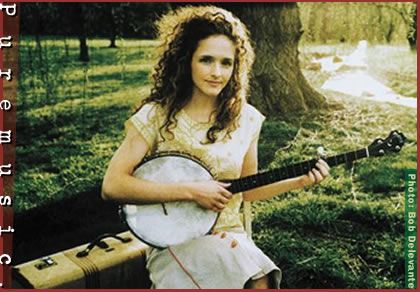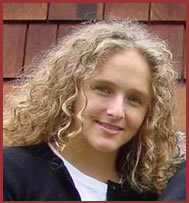
A Conversation with Abigail Washburn (continued)
PM: I'd like to know what banjo players you learned from, in person or from their records?
AW: Okay. One of the first people I learned from was a man named Dwight Diller, who's a banjo player from West Virginia. He's in Pocahontas County. And he learned from the Hammon Family. So I sort of learned a West Virginia frailing style from him. And it's very much a full sound with playing more Irish and Scottish sounding melodic kind of tunes. Then I learned from a man named Ron Mullenex, who was living in a different holler in West Virginia. And he had a pretty different style, actually quite melodic. And he seemed to get more notes out of his clawhammer than Dwight had. And I really liked his versions of some of the tunes. He's particularly involved in preserving some West Virginia Appalachian heritage.
PM: And he was very melodious.
AW: Yeah, he really was. And some time went by, and I listened to albums a bunch. Of course I love Dirk Powell's playing. But then I finally got in touch with a man named Riley Baugus, who's really been a major mentor in forming my banjo style.
PM: Where does he live?
AW: He lives in Walkertown, North Carolina. He's in Surry County. And he learned from the playing of Tommy Jarrell and Fred Cockerham. They're famous for really being the sound of the Round Peak style. Round Peak is actually in Virginia, but it's sort of the northwest corner of North Carolina and the southwest corner of Virginia. You'll hear a lot of people at the Galax Convention playing the Round Peak style banjo. It's a particular style that totally changed the way I played. Again, I heard about him from my friend Rayna, the fiddler. I said, "Rayna, whose playing do you love?" And she said, "Riley Baugus." So I got one of his CDs, and I listened to it, and it was amazing.
You would have seen him on the Cold Mountain Tour, he was part of that. And he plays a bunch with Dirk. He's really grounded in the tradition. It's what he grew up doing. He lives in a trailer in Walkertown, North Carolina, at the end of a dirt road. And I went out there and hung out with him in his trailer for four days, and then went back for another four days a couple weeks later, because I just couldn't get enough. And then I followed him to a camp in West Virginia and took his Advanced Round Peak Style class.
PM: You're really something.
AW: I just followed him, man. He's it! I just think he's the best. And he's become one of my best friends, and he teaches me a lot of what I know. A lot of the playing on the album has ended up being sort of a combination of what I've learned from Riley and the Round Peak style and maybe a little bit fuller sound. And I certainly grew up listening to a lot of rock 'n' roll and folk bands, and really got into the more dramatic indie rock kind of stuff. So that also influences kind of the fullness and the texture that I want to get out of the banjo when I play. And so my style is somewhere in between everything I know and what Riley has taught me. [more about Riley here]
PM: Wow. Well, it's a liability of talking to fascinating people that I've taken a little more of your time than I meant to.
AW: Well, I start talking and then I just go on. I'm sorry. I have this tendency to yap at the mouth when you ask a good question.
PM: No, it's very interesting. Are you what you'd call a spiritual or a religious person?
AW: Oh, very much so, yes.
PM: Any special orientation?
AW: I would say I'm a Christian, heavily influenced by Judeo-Christianity--although I have some philosophies about Christianity that are extremely nonexclusive and would probably be kicked out of a lot of clubs. But yeah, I'm very much a person of faith. I pray a lot, which is a lot of the reason that I was open enough to let my life go in directions that were unexpected. Sometimes I have little ego breakdowns where I go, "Oh, my gosh, this isn't what I'm good at." It's like, "Why am I playing music?" And then I get reminded that there are more divine things at play.
PM: Yeah. And it sounds like you're good at quite a few things.
So, with 1.3 billion people, there are certainly mindblowing possibilities in China for a person like yourself. Do you plan to write more songs in Mandarin, and perhaps tour there in the future, singing more in their mother tongue, perhaps, even than in your own?
AW: Absolutely. I think one of my big goals, as soon as I find the right person or group of people, is definitely to go to China and really spend some time. I would love it if Ben wanted to be a part of this--if we, hopefully, continue to be a duo. I would love to just go, be in a place for years. But in order to keep this career going, that would be unreasonable. Still, I would like to at least spend a few weeks in one spot with a folksinger that I just fell in love there. Sort of like with Riley--as soon as I found Riley, I just followed him. [laughs]
So I'm looking for that to happen in China. And I've met enough people that I feel this might happen this next time around. While I was there this last time, I met the baritone for the Shanghai Opera, and he and I got together. I'd go to Shanghai to be with him, and we did a little bit of studying back and forth. And I went out west and did a back and forth sort of teaching--teaching the music students about Appalachian music, and they taught me about their folk music of western China and southwest China. But I would really love to go back and just study closely with someone from a particular folk tradition.
You're probably familiar with this from living in China, but there are folk songs that everybody knows, but they're actually quite modern, and they've sort of been absorbed by the pop culture. I would really love to dig in to one tradition somewhere. Suzhou style of singing might be a little too ornamental for me, I might go for something more northern. Like up in Xiang Tsi there's a specific area where there's acoustic string-bandy type of music, and a lot of things that remind me of Appalachian music. There are particular ornaments they use, but it almost reminds me of the black and white traditions meeting in Appalachian ballad singing, and things like that. So I would love to go find that place and be there for a while, and let that heavily influence what I do.
But in terms of songwriting, I found this amazing woman in town here, Jing Li Jurca, who I write with. We actually sat down together a couple of days ago and came up with the concept for the next album, which is exciting. And we're just coming up with a bunch of ideas for songs. She's also a very spiritual person, that's probably our big connection.
PM: And she's a Nashville person, right?
AW: She lives in Nashville, but she's from Hanzhou. She grew up in Hanzhou and went to school in Beijing, and was a broadcaster journalist in Beijing. And she was doing very well. I think she came to Nashville to go to the Indiana School of Broadcasting, or something like that. I can't remember. But she ended getting married and staying here, and she lives in Nashville.
She and I were lucky enough to meet when I was trying to translate a warehousing contract. She was working at the Center of Foreign Languages. I met her through helping with this translation. Anyway, we really hit it off, and started writing songs together. Now she's one of my best friends and we're writing songs.
PM: Well, I certainly hope that when we're both back in Nashville that we can sit down and have a cup of coffee. I'd love to meet Jing Li Jurca as well, sometime.
AW: Yeah. I would love for you to meet her, too. She's really a secret weapon, man. She's amazing. She helps me know when I'm on to something really good in the language. Creatively she's real important to me. I'd love for you to meet her.
PM: Well, thanks for your time today, Abby. What a fascinating person you are. I'll look forward to running into you in town.
AW: Sounds good, Frank. Thanks a lot.
 |
print (pdf) |
| listen to clips | |
| buy Traveling Daughter here | |
| uncleearl.net | |
| rileybaugus.com | |
| puremusic home |